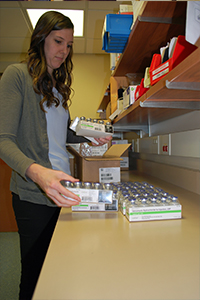Company helps prevent heparin supply disruption for members
By JULIE MINDA
About a year and a half since its launch, Civica Rx now has 18 generic drugs available to its member health systems and has plans to make 14 to 20 more available over the coming year. Within five years, the generic drug company says it expects to be offering 100-plus drugs to its members.
Civica Rx, a nonprofit, nonstock company, was formed in fall 2018 to stave off shortages and price spikes of essential drugs. It shipped its first product — an injectable drug for use with hospitalized patients — in September.

Kharbat
"We are very pleased with our collective progress," said Debbi Ford, chief communications and public affairs officer for the Salt Lake City-based company. "The Civica model is working as planned and essential medications that have been in short supply in hospitals are, or soon will be, available at fair and sustainable prices."
Mohammad "Mo" Kharbat is regional vice president of pharmacy services and health research for St. Louis-based SSM Health, a governing member of Civica Rx. He said the drugs that Civica Rx is making available are "super important clinically." For instance, the drug company is offering its members access to heparin, the preferred anticoagulant for many hospitalized patients. There currently is a threat of heparin supply disruption worldwide, and Civica Rx has helped to ensure supply continuity for its members.
Three-pronged strategy
Civica Rx's initial focus is on stabilizing the supply of crucial sterile injectable medicines used in hospitals. In addition to heparin, such pharmaceuticals include antibiotics, anesthetics, cardiac medications and pain management drugs. (See sidebar.)
The company is reducing chronic shortages of such drugs through a three-pronged strategy: It is working with multiple generic drug manufacturing partners to produce Civica Rx-labeled generic drugs, pursuing multiple applications with the U.S. Food and Drug Administration to expand the list of drugs it can produce and looking to acquire or build its own manufacturing facilities. According to information from Civica Rx, this could include buying production capacity in existing facilities.
Industry disruptor
Dan Liljenquist, chief strategy officer for Intermountain Healthcare, chairs Civica Rx's board. He came up with, and developed the concept for, Civica Rx, envisioning it as a social welfare-type organization in which there are no ownership stakes and thus no profit incentives.

Liljenquist
When the company was first announced, Liljenquist explained to Catholic Health World that Civica Rx was needed because market inefficiencies were disrupting the supply and distorting the pricing of a number of essential drugs.
He said for some drugs that have been around for decades and are still widely used, there are not many incentives for new entrants to manufacture the drugs even in the face of supply shortages and price spikes. While one or two manufacturers often can fulfill the demand for a particular drug, having a small number of manufacturers leaves drug purchasers vulnerable to anything that could go wrong along those manufacturers' fragile and complex supply chains.

Michelle Schmitt, SSM Health regional pharmacy business manager, unpacks first delivery of Civica Rx vancomycin antibiotic medication at SSM Health St. Mary’s Hospital – Madison in Wisconsin
However, were a new producer to come online and increase supply, prices would decline for all makers, reducing the potential for profit. "So, we're just not seeing private capital flow into competition in some of these markets," said Liljenquist.
SSM Health's Kharbat said when hospitals cannot secure a supply of vital generics, nonpreferred therapies may be used as substitutes, but these drugs may be less effective, and clinicians may not be as familiar with them. Also, the substitutes may be more expensive than the preferred drug, which can cause a financial burden for the patient, Kharbat said.
Membership model
Currently Civica Rx has 48 member health systems representing more than 1,200 hospitals in 46 states. Of those systems, 10 are governing board members, including CommonSpirit Health, Providence, SSM Health and Trinity Health. Governing members oversee the organization, and each gets a seat on the board. More than a dozen systems are founding members, including Hospital Sisters Health System. Founding members get input on the prioritization of drugs for manufacturing. Over 20 systems are partnering members, including SCL Health. Like founding members, partnering members can contract to purchase drugs from Civica Rx.
Last month, Civica Rx, the Blue Cross Blue Shield Association as well as 18 independent and locally operated Blue Cross and Blue Shield companies said in a release that they will partner to create a new Civica Rx subsidiary "dedicated to lowering the cost of select generic drugs" dispensed to consumers.
Under the partnership, Blue Cross Blue Shield and its licensee companies are committing $55 million to the subsidiary. Civica Rx and the Blue Cross Association said in a release the subsidiary will acquire and develop abbreviated new drug applications for select high-cost generics and join with Civica Rx and manufacturing partners to inject competition intended to lower prices. Generic medications will become available under this arrangement by early 2022.
Managing to prevent shortage
In December, Civica Rx began offering heparin to its member health systems. That drug is prescribed to treat or prevent blood clots. It is commonly prescribed for those receiving dialysis and those undergoing cardiac procedures, among other patients. According to information from the American Society of Health System Pharmacists as well as from Civica Rx, there is a threat of disruption to the supply of heparin because of a potential shortage of a raw ingredient. One manufacturer, Fresenius Kabi based in Germany, said the disruption is partly due to an outbreak of swine fever in China, which is a major global supplier of the active pharmaceutical ingredient in heparin — that ingredient is derived from pigs. According to an August Bloomberg article, China has lost as many as 150 million to 200 million animals to the disease.
Since Civica Rx's supplier of heparin, Hikma, sources its ingredients from the U.S., its supply was not disrupted.
Kharbat said of heparin and the other drugs now in the pipeline: "These drugs are used heavily, and there had been supply disruptions. But now we have these products available and affordable. We feel very good about what Civica Rx has accomplished. In 15 months, it has come a long way."
Drugs currently available to Civica Rx members
- Bacitracin, an antibiotic that helps prevent bacterial infection
- Daptomycin, an antibiotic used to treat bacterial infection
- Dexamethasone sodium phosphate, a corticosteroid hormone used to treat allergic reactions, arthritis, blood diseases, breathing problems, certain cancers, eye diseases, intestinal disorders, skin diseases and other conditions
- Diazepam, a benzodiazepine that helps to treat anxiety, alcohol withdrawal, seizures and other ailments
- Fentanyl citrate, the citrate salt of a synthetic opioid with analgesic and anesthetic properties
- Glycopyrrolate, an anticholinergic used with other drugs to treat stomach and intestinal ulcers
- Heparin sodium, an anticoagulant that helps to prevent and treat blood clots and blood clotting disorders
- Ketamine hydrochloride, a general anesthetic
- Labetalol hydrochloride, an alpha blocker and beta blocker used to treat high blood pressure
- Lidocaine hydrochloride, a local anesthetic that causes temporary loss of feeling in the skin and mucous membranes
- Metoprolol tartrate, a beta blocker used to treat high blood pressure
- Midazolam, a benzodiazepine used in children before a procedure or anesthesia to cause drowsiness and decrease anxiety
- Morphine sulfate, an opioid analgesic that helps relieve pain
- Naloxone hydrochloride, an opioid antagonist that prevents or reverses the effects of opioids
- Neostigmine methylsulfate, a cholinesterase inhibitor that helps reverse the effects of certain neuromuscular blocking agents after surgery
- Ondansetron, a serotonin receptor antagonist that helps prevent nausea and vomiting caused by chemotherapy and radiation therapy
- Prochlorperazine edisylate, a phenothiazine antipsychotic used principally in the treatment of nausea, vomiting and vertigo
- Vancomycin hydrochloride, an antibiotic that helps treat infections